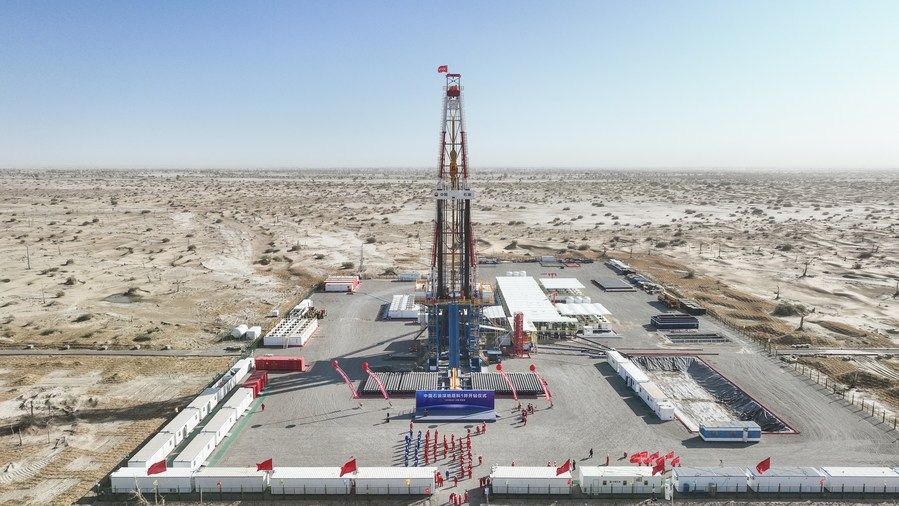China's 10,000-meter drill into Earth’s rock layers
Deep Earth exploration is all about diving into the unknown, uncovering the secrets lurking beneath our feet.

A few minutes every morning is all you need.
Stay up to date on the world's Headlines and Human Stories. It's fun, it's factual, it's fluff-free.
The backstory: Deep Earth exploration is all about diving into the unknown, uncovering the secrets lurking beneath our feet. One prime example of this kind of exploration is the Russian Kola Superdeep Borehole, which is the deepest hole we’ve ever dug so far. Imagine this – they drilled tirelessly for almost two decades and managed to reach an incredible depth of 12,262 meters (40,230 feet) back in 1989.
China has also been interested in exploring the depths of the planet’s crust. Back in 2021, President Xi Jinping got the Chinese scientific community all fired up, pushing them to explore four strategic frontiers: deep space, deep sea, deep Earth and what they call "deep blue," which relates to computer science and things like AI. Thanks to his call, Chinese scientists are on a mission to tap into even trickier oil and gas resources that are hidden in challenging geological areas. But deep Earth exploration isn't a piece of cake. It requires heaps of resources, manpower and some serious tech and tools to crack the Earth’s tough crust.
More recently: Last month, China kicked off a major drilling project in Xinjiang for an oil and gas well called Yuejin 3-3. With this well, the country is aiming for a depth of a whopping 9,472 meters (31,076 feet), which would make it the deepest well in all of Asia. It's part of China's broader Deep Earth drilling initiative, led by energy giant Sinopec. It has already built more than 120 deep wells in the Taklamakan Desert as part of this ambitious project.
The development: Chinese scientists have now reportedly started drilling a humongous over-10,000-meter (around 32,000 feet) hole in Xinjiang, which will be the deepest hole ever dug in the country. So, what's the big idea behind all this? Well, these scientists have a couple of goals in mind. First off, they want to explore deep beneath the surface to further research and science and uncover valuable mineral and energy resources. By doing so, China could reduce its reliance on importing some of those things from foreign nations. Also, knowing more about what all’s under there can help scientists better predict natural disasters.
Now, let's get into the nitty-gritty details. They've chosen a specific location for the Take-1 well in the Tarim Basin. It's pretty close to the Fuman oilfield, which is already known to hold enormous oil reserves. But get this, China plans to go even deeper than other wells, plunging down to an astonishing depth of 11,100 meters (36,000 feet).
You might be wondering, how on Earth will they achieve this? Well, China has an automated drilling rig, which is the first of its kind in the world. This bad boy can actually dig as deep as 12,000 meters (39,000 feet).
As China drills away in Xinjiang, the scientists are set to pass through not one, not two, but more than 10 layers of solid rock. It's like a journey back in time, all the way to around 145 million years ago, during the Cretaceous period. So, imagine digging so deep that you can explore rock layers that predate human existence on Earth by millions of years. That's how deep this hole is going to be.
Fun fact: The Cretaceous period ended with an extinction-level event that killed off the dinos. Digging to these deep levels could even provide more answers about this event.
Key comments:
“The construction difficulty of the drilling project can be compared to a big truck driving on two thin steel cables,” said Sun Jinsheng, a scientist at the Chinese Academy of Engineering, to Xinhua.
"It is a science about supporting and sustaining life on Earth. Without it, we cannot thrive," said Liu Jiaqi, a geophysicist and an academician of the Chinese Academy of Sciences to China Daily in 2021. “Therefore, we need to strengthen our basic research into deep Earth sciences so that we can find and mine the resources our country needs."




Comments ()